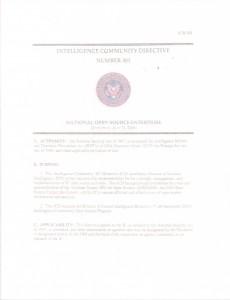
Phi Beta Iota Editorial Comment (DOI: 11 August 2009)
This well-intentioned document is the sole surviving legacy of the first ADDNI/OS who was destined to fail for multiple reasons, not least of which was the lack of seriousness with which all three DNI's have chosen to treat OSINT. As best we can tell OSINT is a side-show delegated by the DDNI/C to the National Intelligence Council, which lacks the gravitas as well as the knowledge to do anything constructive with an IC OSINT capability that exists in name only, the scattered kludge of activities not-with-standing (and less that of the U.S. Special Operations Command J-23, which is the only serious OSINT capability now operational in the USG).
We like this document. It is a good foundation for further deliberation. Right now it is best used to catalog what is NOT happening, for example:
POLICY 1b. Leverage burden sharing, partnerships, and outside capabilities.
POLICY 1c Organizations will share their information and capabilities to the fullest extent
The ADDNI/OS is in violation of this ICD as well as ICD 300 in delegating chairmanship of the National Open Source Council (NOSC) to the Director of the Open Source Council. That was ill-advised and that delegation should be immediately rescinded.
The NOSC portion of this ICD is useful, and inspires the logical follow-on need for similar capabilities for the US consumers of OSINT (state and local as well as private sector) who also have much to contribute but no place to send it; and for multinational consumers and producers of OSINT, both governmental and non-governmental.
The ICD calls for the NOSC to provide evaluations of the IC's open source gaps and capabilities. To our knowledge this has not happened, no doubt the result of a) virtually all of the NOSC members are not OSINT specialists, just bureaucrats handling OSINT as an additional duty; and b) they don't know what they don't know.
The ICD is flawed in allowing the OSC to report to a Deputy Director of the CIA. We strongly recommend that the Foreign Broadcast Information Service be reconstituted, that the CIA version of the OSC be disbanded, and that the Department of Defense be tasked with both creating a proper DNI OSC, and funding, on a non-reimbursable basis, the Open Source Agency recommended by the 9-11 Commission (pages 23 and 413) but under diplomatic auspices to better interact with all who have OSINT to contribute that do not wish to deal directly with an intelligence entity.
The ICD is flawed in allowing contractual obligations to prevent instant sharing of all OSINT acquired from outsourced means. This must be changed to demand immediate Modifications to all contracts so constrained, on penalty of losing all option years if not done. The ICD does not understand that contractors can keep original copyright but must be forced to provide the USG with an unlimited unrestricted license that includes public access to the information, as the National Institute of Health (NIH) is has been pioneering for over a decade.
The ICD tasks the IC element alone, not the consumers, with designating a primary open source coordinator, but fails to demand that this be a full-time job held by an OSINT specialists with competencies and qualifications such as need to be established by the DDNI/C and DDNI/M. Put bluntly, with the exception of CIA and DIA, none of the NOSC members are qualified for their role within the NOSC.
The DEFINITIONS that conclude this ICD can be improved upon. Virtually all of what is called OSINT today, except within the US Special Operations Command, is nothing more than Open Source Information. OSINT is tailored and actionable intelligence, not the New York Times or the daily OSC report. OSIF that is classified, as the OSC is prone to do, is neither OSIF nor OSINT.



